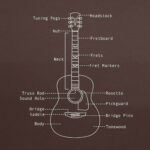While acoustic and classical guitars might seem similar at first glance, both being six-stringed instruments with a soundhole and tuning pegs, there are crucial distinctions that significantly impact their playability, sound, and ideal musical genres. Understanding these differences is essential whether you’re a beginner choosing your first guitar or an experienced player looking to expand your collection. Let’s delve into the key factors that set these two guitar types apart.
Shape and Body Size
Acoustic guitars typically come in a variety of body shapes, with the dreadnought being the most iconic and popular. You’ll also find parlor guitars, which are smaller-bodied, and jumbo guitars, which are larger. Classical guitars, on the other hand, generally adhere to a more standardized body shape, often described as being closer to the traditional “classical” form.
Parlor acoustic guitars are often smaller than standard classical guitars, making them comfortable for players who prefer a more compact instrument. However, acoustic guitar sizes can vary widely depending on the manufacturer and style, so it’s not always a straightforward size comparison.
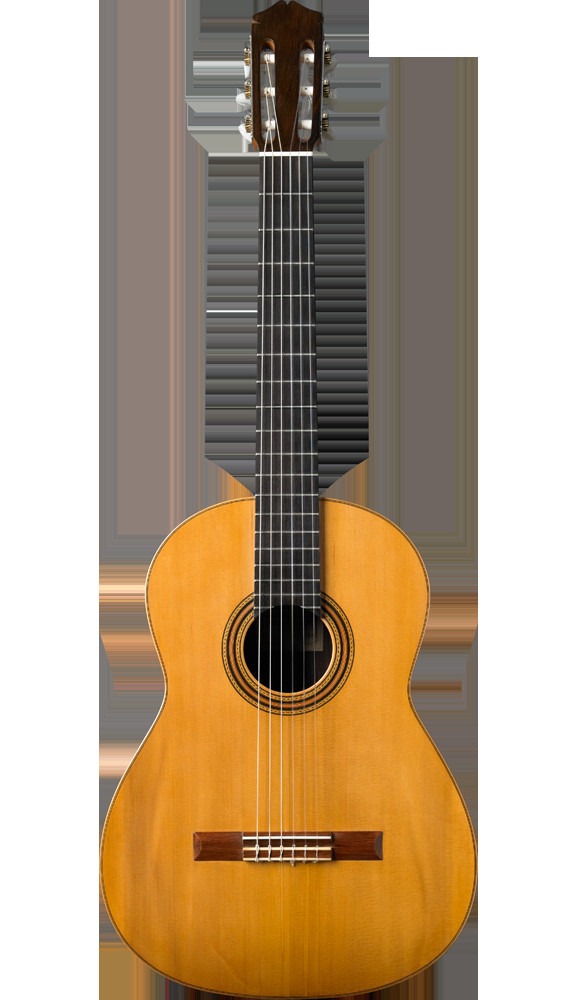 Acoustic Guitar
Acoustic Guitar
Image alt text: Visual comparison of acoustic and classical guitar shapes, highlighting the different body styles and proportions.
Neck Width and Fretboard
One of the most noticeable differences between an Acoustic Vs Classical Guitar is the neck. Classical guitars are characterized by a wider neck compared to acoustic guitars. This wider neck is designed to accommodate the spacing needed for fingerstyle playing, which is the primary technique used in classical guitar music. The wider string spacing makes it easier for the fingers to pluck individual strings cleanly.
Acoustic guitars, in contrast, typically have narrower necks. This design is more conducive to strumming chords and playing lead lines with a pick. The narrower neck and tighter string spacing on an acoustic guitar facilitate faster chord changes and comfortable strumming patterns. It’s also worth noting that classical guitars often lack fret markers on the fretboard face, relying instead on side markers. While this might be a minor adjustment for some players, it’s a traditional characteristic of classical guitars.
Bridge Design
The bridge, which anchors the strings to the guitar body, also differs significantly between acoustic and classical guitars. Classical guitars utilize a tie-on bridge. With this type of bridge, the nylon strings are manually tied around the bridge in a specific knot to secure them. This method is similar to how strings are attached to a ukulele. While traditional, some modern classical guitars and strings are now designed to accommodate ball-end classical strings, offering an alternative and perhaps simpler stringing method.
Acoustic guitars employ a pin bridge. This system uses bridge pins to hold the steel strings securely in place. The strings have ball ends that are slotted into the bridge, and the pins are inserted to wedge the ball ends against the guitar body, creating a strong and reliable anchor point for the higher tension steel strings.
Strings: Nylon vs Steel
The most fundamental difference between acoustic and classical guitars lies in the strings they use. Classical guitars are strung with nylon strings, whereas acoustic guitars use steel strings. This string difference is the primary factor contributing to the distinct sounds and playing experiences of each guitar type.
Nylon strings, used on classical guitars, are significantly thicker and produce a warmer, mellower, and softer tone compared to steel strings. The treble strings (G, B, high E) are made of solid nylon monofilament, while the bass strings (E, A, D) consist of a nylon multifilament core wrapped with silver-plated copper. Nylon strings are gentler on the fingertips, which makes them a popular choice for beginners or players with sensitive fingers. However, the sound of nylon strings is less common in mainstream modern music genres. Classical guitars are ideally suited for classical music, flamenco, and Spanish guitar styles, where their warm and nuanced tone excels.
Steel strings, used on acoustic guitars, produce a brighter, louder, crisper, and more resonant sound. They offer greater projection and sustain than nylon strings. Acoustic guitar strings are made from various metals and alloys, including bronze, phosphor bronze, and nickel, each offering slightly different tonal characteristics. Steel strings are thinner than nylon strings, and while they can be tougher on uncalloused fingers initially, they are essential for achieving the bright and powerful sound characteristic of most modern musical genres. Acoustic guitars are the go-to choice for rock, pop, folk, blues, country, and many other contemporary styles.
String Types in Detail
Classical Guitar Strings
Ernie Ball offers a range of classical guitar strings, each designed to provide unique tonal qualities and playing experiences.
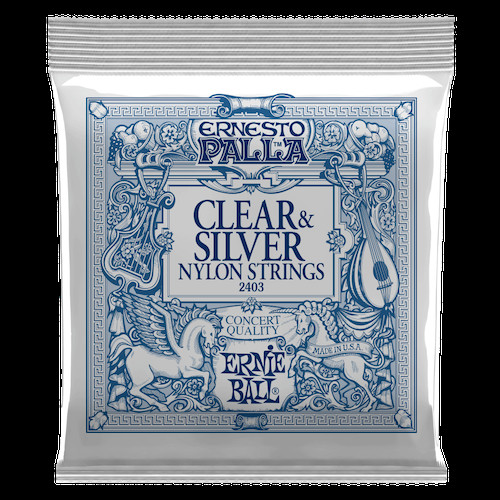 Ernesto Palla Clear and Silver Nylon Classical Guitar Strings Packaging
Ernesto Palla Clear and Silver Nylon Classical Guitar Strings Packaging
Image alt text: Ernie Ball Ernesto Palla Clear & Silver Nylon Classical Guitar Strings packaging, showcasing the product for classical guitar players.
Ernesto Palla Clear & Silver Nylon Classical Guitar Strings
These clear and silver nylon strings are a popular choice for classical guitarists. Known for their concert quality, they deliver a smooth, rich tone with exceptional clarity and consistent performance, making them suitable for a wide range of classical styles.
 Ernesto Palla Black and Silver Nylon Classical Guitar Strings Packaging
Ernesto Palla Black and Silver Nylon Classical Guitar Strings Packaging
Image alt text: Ernie Ball Ernesto Palla Black & Silver Nylon Classical Guitar Strings packaging, highlighting the warm tone suitable for folk and classical music.
Ernesto Palla Black & Silver Nylon Classical Guitar Strings
Crafted from a different nylon composition, these black nylon strings produce a warmer, purer sound with enhanced treble overtones. Black nylon strings are particularly favored by folk guitarists and those seeking a warmer classical tone.
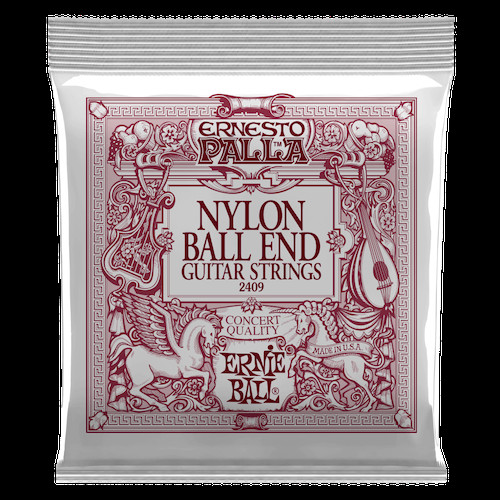 Ernesto Palla Black and Gold Ball-End Nylon Classical Guitar Strings Packaging
Ernesto Palla Black and Gold Ball-End Nylon Classical Guitar Strings Packaging
Image alt text: Ernie Ball Ernesto Palla Black & Gold Ball-End Nylon Classical Guitar Strings packaging, emphasizing the ball-end design for easier string changes.
Ernesto Palla Black & Gold Ball-End Nylon Classical Guitar Strings
Featuring gold wound basses made of 80/20 bronze wrapped around a nylon multifilament core, these strings offer a smooth, rich tone. The ball-end construction provides a significant advantage for faster and easier string changes compared to traditional tie-end strings.
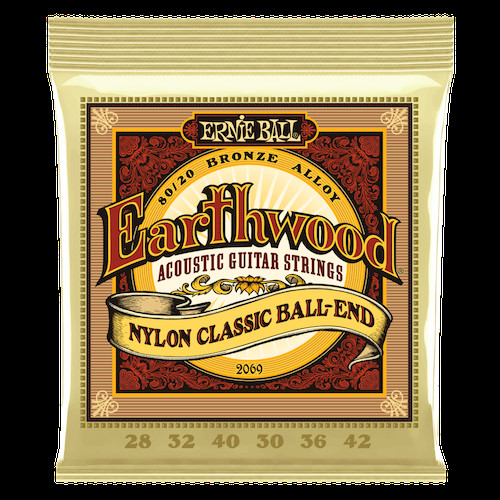 Earthwood Folk Nylon, Clear & Gold Ball End, 80/20 Bronze Acoustic Guitar Strings Packaging
Earthwood Folk Nylon, Clear & Gold Ball End, 80/20 Bronze Acoustic Guitar Strings Packaging
Image alt text: Ernie Ball Earthwood Folk Nylon Acoustic Guitar Strings packaging, showcasing the blend of nylon trebles and bronze basses for a unique acoustic tone.
Earthwood Folk Nylon, Clear & Gold Ball End, 80/20 Bronze Acoustic Guitar Strings
Ernie Ball Earthwood Folk Nylon acoustic guitar plain strings are made from a solid clear nylon filament, producing rich, pure treble tones with a percussive attack. The wound strings are constructed with 80/20 bronze wrapped around a multifilament nylon core, blending nylon trebles with bronze basses for a unique tonal palette.
Acoustic Guitar Strings
Ernie Ball provides a diverse selection of acoustic guitar strings designed to cater to various playing styles and tonal preferences.
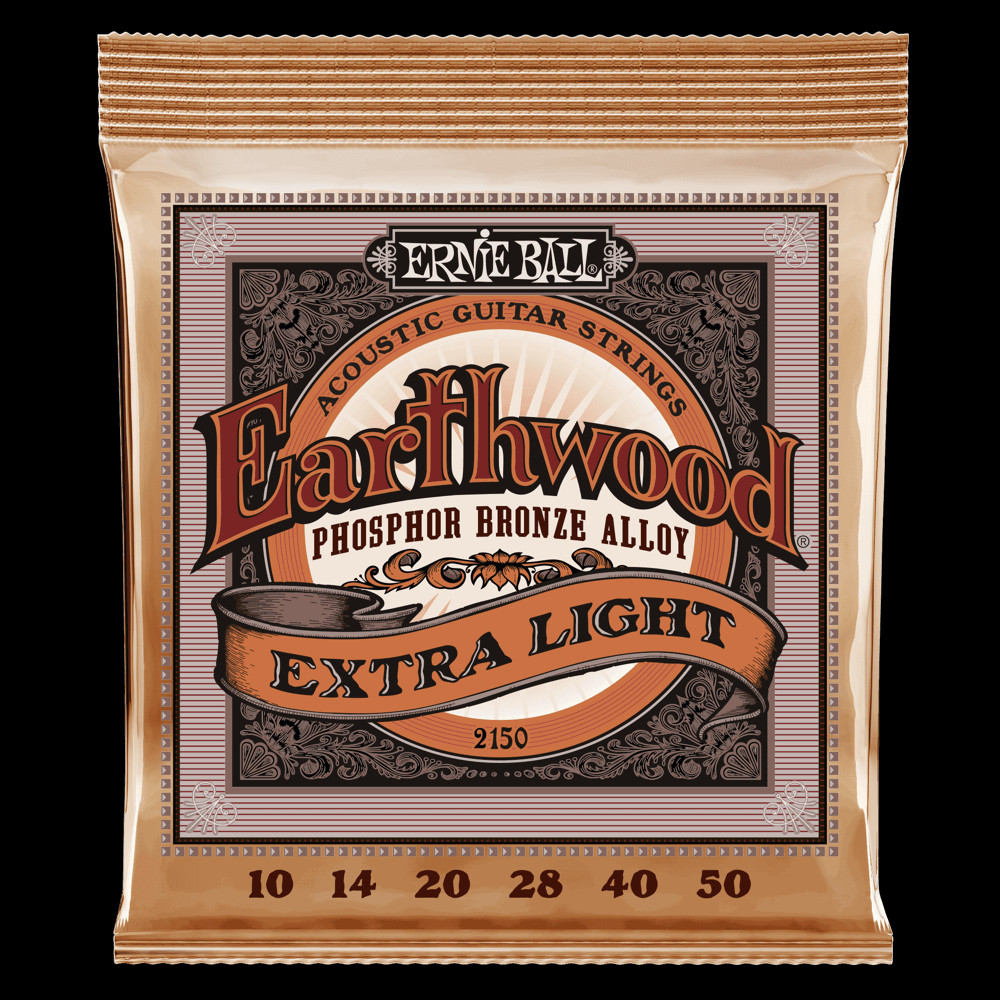 Earthwood Acoustic Guitar Strings Packaging
Earthwood Acoustic Guitar Strings Packaging
Image alt text: Ernie Ball Earthwood Acoustic Guitar Strings packaging, highlighting the availability in Phosphor Bronze and 80/20 Bronze alloys for different acoustic tones.
Earthwood Acoustic Guitar Strings
Earthwood acoustic guitar strings are available in both Phosphor Bronze, known for a mellow, ringing sound, and 80/20 Bronze, which delivers crisp, pleasing overtones. This range allows players to choose the ideal string alloy to match their guitar and musical style.
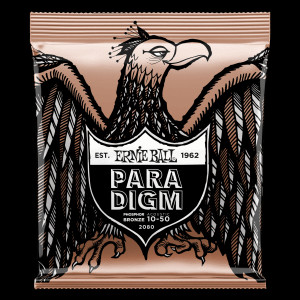 Paradigm Acoustic Guitar Strings Packaging
Paradigm Acoustic Guitar Strings Packaging
Image alt text: Ernie Ball Paradigm Acoustic Guitar Strings packaging, emphasizing the unprecedented strength and long life while maintaining Earthwood tone.
Paradigm Acoustic Guitar Strings
Paradigm acoustic guitar strings are offered in both 80/20 and Phosphor Bronze varieties. These strings are engineered for unprecedented strength and extended string life while preserving the authentic Earthwood tone and feel that players expect.
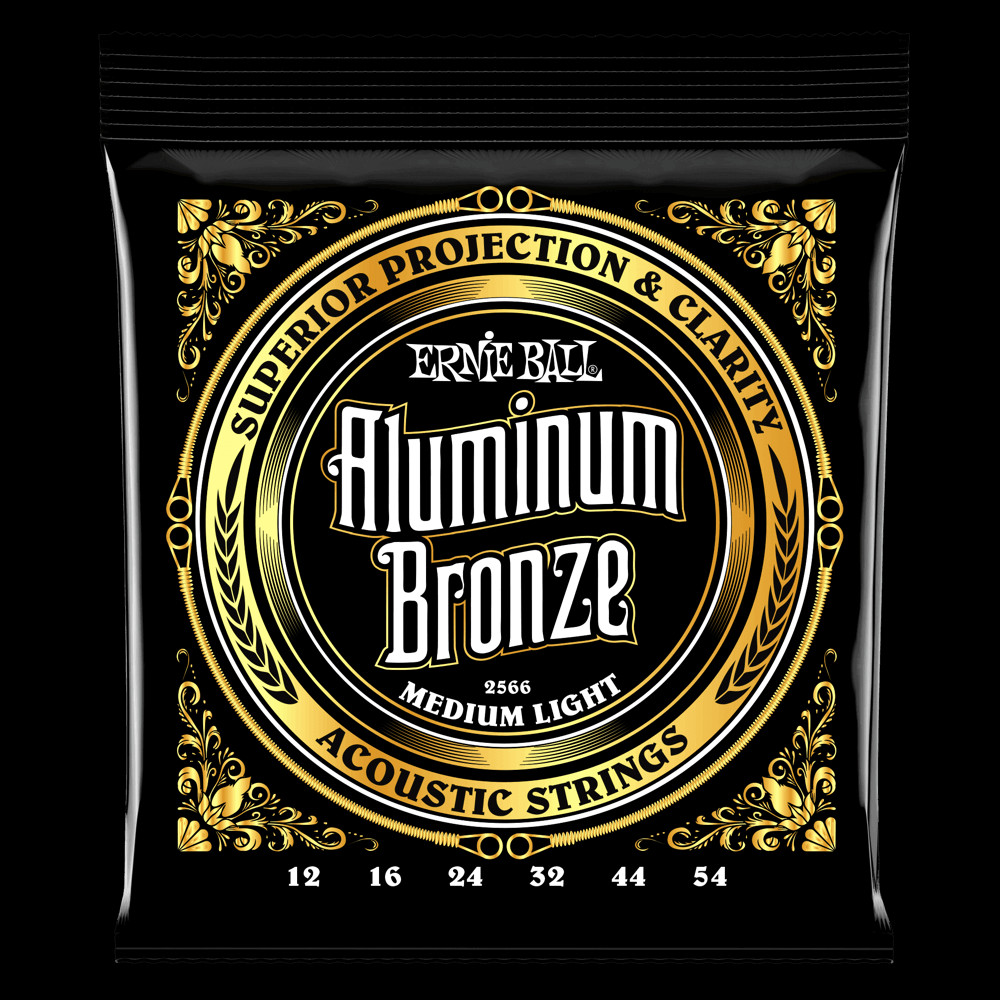 Aluminum Bronze Acoustic Guitar Strings Packaging
Aluminum Bronze Acoustic Guitar Strings Packaging
Image alt text: Ernie Ball Aluminum Bronze Acoustic Guitar Strings packaging, showcasing the enhanced projection, clarity, and corrosion resistance of Aluminum Bronze alloy.
Aluminum Bronze Acoustic Guitar Strings
Ernie Ball Aluminum Bronze Acoustic Guitar Strings are designed for enhanced projection and clarity compared to traditional bronze strings. They also offer improved corrosion resistance. Constructed with Ernie Ball Maraging Steel hex cores and Aluminum Bronze wrap wire, these strings deliver pronounced lows and crisp, brilliant highs, making them a versatile choice for acoustic players.
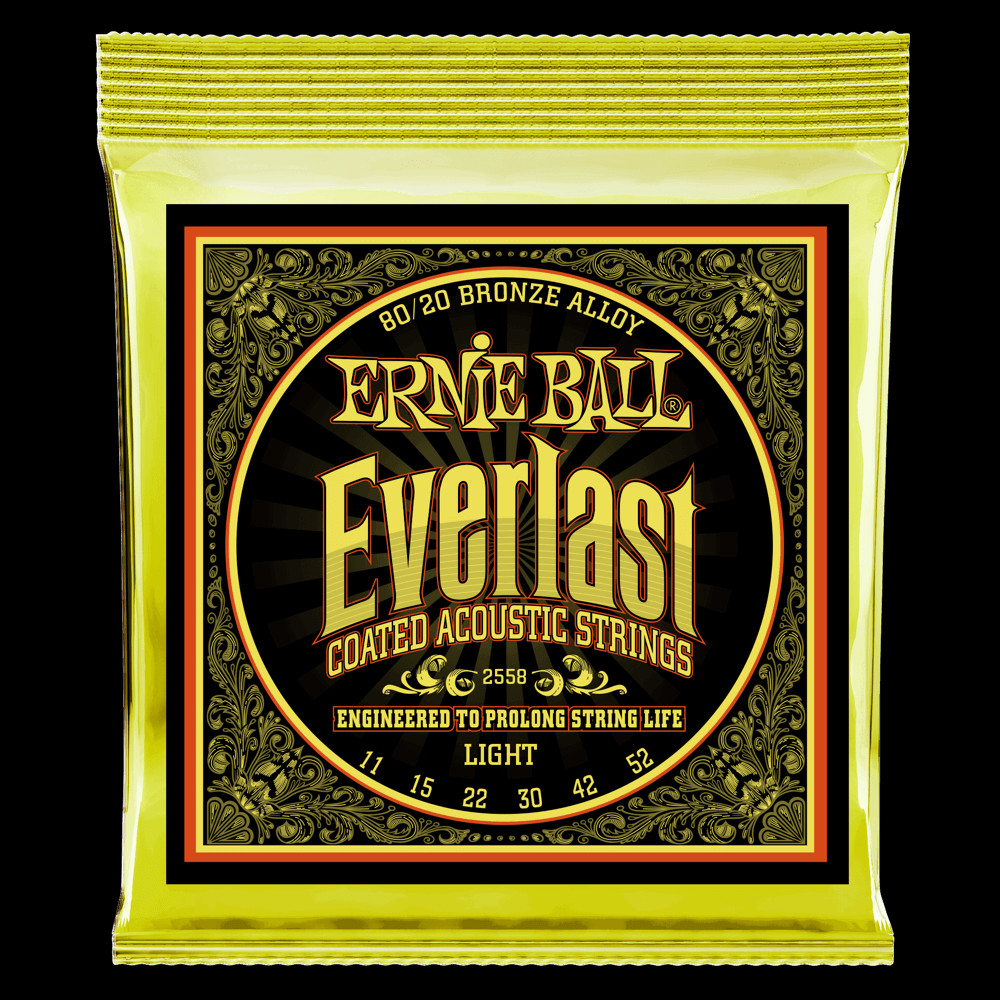 Everlast Coated Acoustic Strings Packaging
Everlast Coated Acoustic Strings Packaging
Image alt text: Ernie Ball Everlast Coated Acoustic Strings packaging, highlighting the nanotechnology coating for moisture and oil resistance and prolonged string life.
Everlast Coated Acoustic Strings
Everlast Coated acoustic strings are available in both 80/20 and Phosphor Bronze. These strings utilize groundbreaking nanotechnology to repel moisture and oils that can negatively impact tone and string life. The proprietary treatment is applied to both the inner hex core and outer wrap wire, providing comprehensive protection without compromising tone or feel, making them ideal for players seeking extended string life.
To hear classical guitar strings in action, check out Steve Morse playing Ernie Ball Ernesto Palla Clear & Silver Nylon Classical Guitar Strings.
Conclusion: Choosing Your Guitar
The choice between an acoustic and a classical guitar ultimately depends on your musical preferences and playing style. If you are drawn to classical music, flamenco, or fingerstyle guitar and prefer a warmer, mellower tone and wider neck, a classical guitar is likely the better choice. If you are interested in rock, pop, folk, country, blues, and strumming chords, and prefer a brighter, louder sound and narrower neck, an acoustic guitar will be more suitable. Understanding the core differences between acoustic vs classical guitar will guide you in selecting the instrument that best aligns with your musical aspirations.

